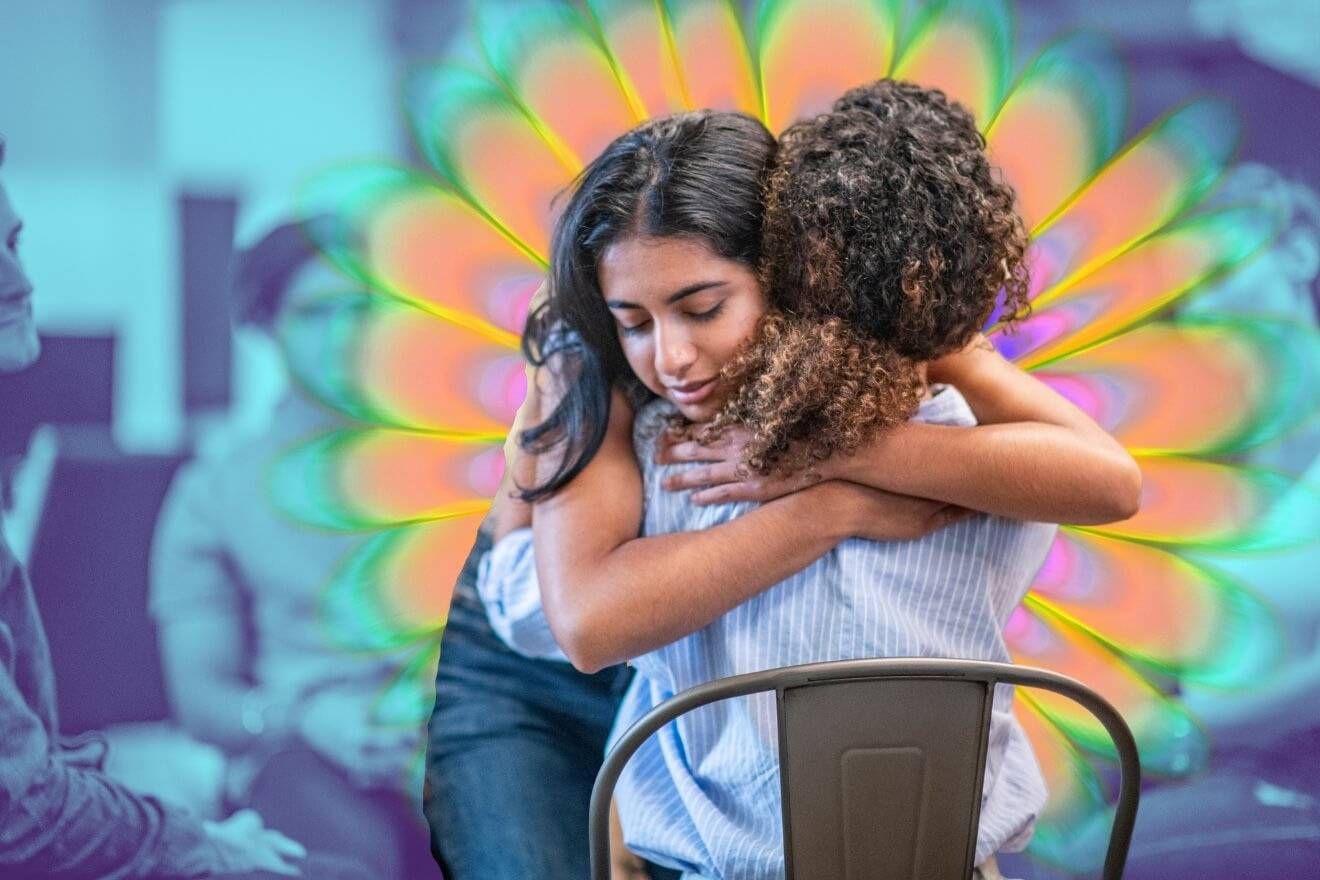As more states begin to decriminalize psychedelics, it’s inevitable that their use will increase and become mainstream. It’s crucial that those taking these substances understand the risks, potential adverse consequences, and how to safely use them—with the appropriate support and knowledge.
A trip sitter plays an important role in keeping a person safe during a psychedelic experience and minimizing their risk of a “bad trip”. In addition, they can help increase their chances of experiencing a transformative and healing state of consciousness.
Read on to learn more about what a trip sitter is, what the role entails, and the qualities that psychedelic users look for.
What is a Trip Sitter?
A trip sitter is someone who takes care of an individual as they embark on a psychedelic trip. They are not under the influence of any substances. They remain sober so that they can keep the tripper safe; therefore, the practice of trip-sitting is considered a form of harm reduction.
Learn more about harm reduction by taking our free course, Riding the Wave: Principles of Psychedelic Harm Reduction.
Trip Sitter Roles and Responsibilities
To clarify, trip sitters are not responsible for providing or procuring psychedelic substances – these are currently still illegal in most states. They are not offering therapy which requires specialized training.
A trip sitter has a prominent role before, during, and at the end of a person’s psychedelic experience.
Before the Trip
A trip sitter will discuss with the individual several things before the session including expectations, boundaries, guidelines, and intentions. For instance, some people find supportive touch can help ease the discomfort experienced during challenging moments. Others, however, may find it worsens their state. A trip sitter will want to understand what feels comfortable and what doesn’t before the day of the session.
To ensure a psychedelic experience runs as smoothly as possible, a trip sitter will help the individual develop a loose plan for the session. They want the tripper to feel as prepared as possible. Questions they may ask the individual include:
- When do you plan to have your session? What time of day? Have you set enough time aside (at least 6 to 9 hours) for this experience, taking into consideration how long it takes for the drug effect to wear off?
- Where do you think is a fitting place to do this? Is there a safe location that you know of? Do you have access to outdoor space or nature that may enhance your experience?
- Will there be anyone who may show up unexpectedly or interrupt the session such as family members, roommates, or mail delivery?
- Is there any particular music playlist you would like to have on during your session?
The trip sitter may also talk about how the set and setting affect the tripper’s experience. This includes their mindset before the trip and the social and physical environment during the experience.
During the Trip
Trip sitters are not professionals with training in psychedelic-assisted therapy who can help guide your session.
If you’re looking for someone with professional training, be sure to find a licensed mental health provider in our industry-leading and vetted psychedelic therapy directory.
Instead, trip sitters are responsible for supporting the individual and keeping them away from physical and emotional harm. They do not instruct, provide directions, ask questions, or overly engage with the tripper. Their role is to “hold space” by listening and staying present. They will keep track of the time with a watch and minimize the use of their phone so that they are completely attentive to your needs.
Trip Sitters can help create a safe and healing environment best suited for the tripper. They will ensure the right music is being played, changing tracks and volume depending on how the music is affecting the individual. They will remove any objects or devices that can potentially hurt the person during their session.
The trip sitter may help the person move from one place to another as the drug effect can alter the tripper’s balance and motor coordination.
They will ensure the individual’s physiological needs are fulfilled. For instance, they may bring the person water and/or food to keep them hydrated and nourished. They may provide them with blankets, pillows and/or clothing if they are feeling cold or uncomfortable. They may help them remove clothing if they are feeling too warm.
If the individual enters an emotional state and begins to cry, the trip sitter can offer tissues and supportive touch for comfort. They do not offer to talk through their experience or provide advice. The role is to be a supportive presence.
End of the Trip
As the effect of the psychedelic substance wears off, the trip sitter will stay with the individual to ensure they are physically and mentally stable before leaving them. They may also help make logistic arrangements.
For instance, if the person is not in their home, the trip sitter may book transportation and ensure they arrive safely. If the person is hungry, the trip sitter may order food or prepare a simple meal or snack for them.
Trip Sitter Characteristics
Trust, presence, and empathy were key characteristics of trip sitters found among those who have used psychedelics.
Trip sitters are able to “hold space” and let the person fully experience the sensations freely without interference—unless it puts them in harm’s way.
Other trip sitter characteristics include being non-judgmental, non-intrusive, calm, and level-headed. They are responsible and know what to do in case of an emergency.
Preference For Trip Sitters With Lived Experiences
Psychedelic-assisted therapy’s best practices are continuously being reviewed, updated, and explored. The emerging field of research is starting to look at psychedelic use in non-clinical settings.
A trip sitter with direct psychedelic experiences is seen as valuable among those who use these substances.
A study looked at trip-sitter preferences among psychedelic users. This was done by conducting a thematic analysis of the discussions that occurred in two online forums: DMT Nexus and The Shroomery.
Two key themes were identified in the analysis:
Lived Experience
The results showed that psychedelic users preferred trip sitters who have used psychedelic substances before and/or experienced an expanded state of consciousness.
Participants valued the person caring for them during their trip to have a health and medical background, as well as being educated about current psychedelic research and knowledge.
Lastly, psychedelic users also considered having previous trip-sitting experiences as important.
Remote Sitting
The results identified that trip sitting does not necessarily require the physical presence of a person. It can be performed remotely. Participants shared that through the use of online tools, they were able to be taken care of and stay safe while maintaining privacy during their session.
Learn more about the upsides and downsides of virtual ketamine-assisted psychotherapy.
The researchers explained that psychedelic users’ preference for trip sitters with lived experience may be due to increased empathy and decreased stigma. A user may feel less stigmatized with a trip sitter who has experienced the effects of psychedelics. This is because they believe the carer is therefore more empathetic and can understand what they are about to go through. They feel safer being vulnerable on a trip.
The study concluded that using trip sitters with lived experiences can maximize the benefits of empathy. It also resolved that more research is required regarding remote trip-sitting services.
If you’re looking to expand your knowledge on becoming a trip sitter, be sure to check out our course, Psychedelic Counseling: The Foundations of “Trip Sitting”.
The course delves into:
- How to design a healing space
- Tips to handle common situations during a session
- How to maximize the potential for healing
- Support clients during a challenging experience
- How to mitigate a potential “bad trip”
- How to practice self-care
Follow your Curiosity
Sign up to receive our free psychedelic courses, 45 page eBook, and special offers delivered to your inbox.References
Engel, L. B., Thal, S. B., & Bright, S. J. (2022). Psychedelic Forum Member Preferences for Carer Experience and Consumption Behavior: Can “Trip Sitters” Help Inform Psychedelic Harm Reduction Services?. Contemporary Drug Problems, 009145092211214. https://doi.org/10.1177/00914509221121420
Thal, S. B., Engel, L. B., & Bright, S. J. (2022). Sober sitter or coconsumer? Psychedelics, online forums and preferences for interpersonal interactions. Addiction Research & Theory, 1–9. https://doi.org/10.1080/16066359.2022.2065268
Thal, S., Engel, L. B., & Bright, S. J. (2022). Presence, Trust, and Empathy: Preferred Characteristics of Psychedelic Carers. Journal of Humanistic Psychology, 002216782210813. https://doi.org/10.1177/00221678221081380







